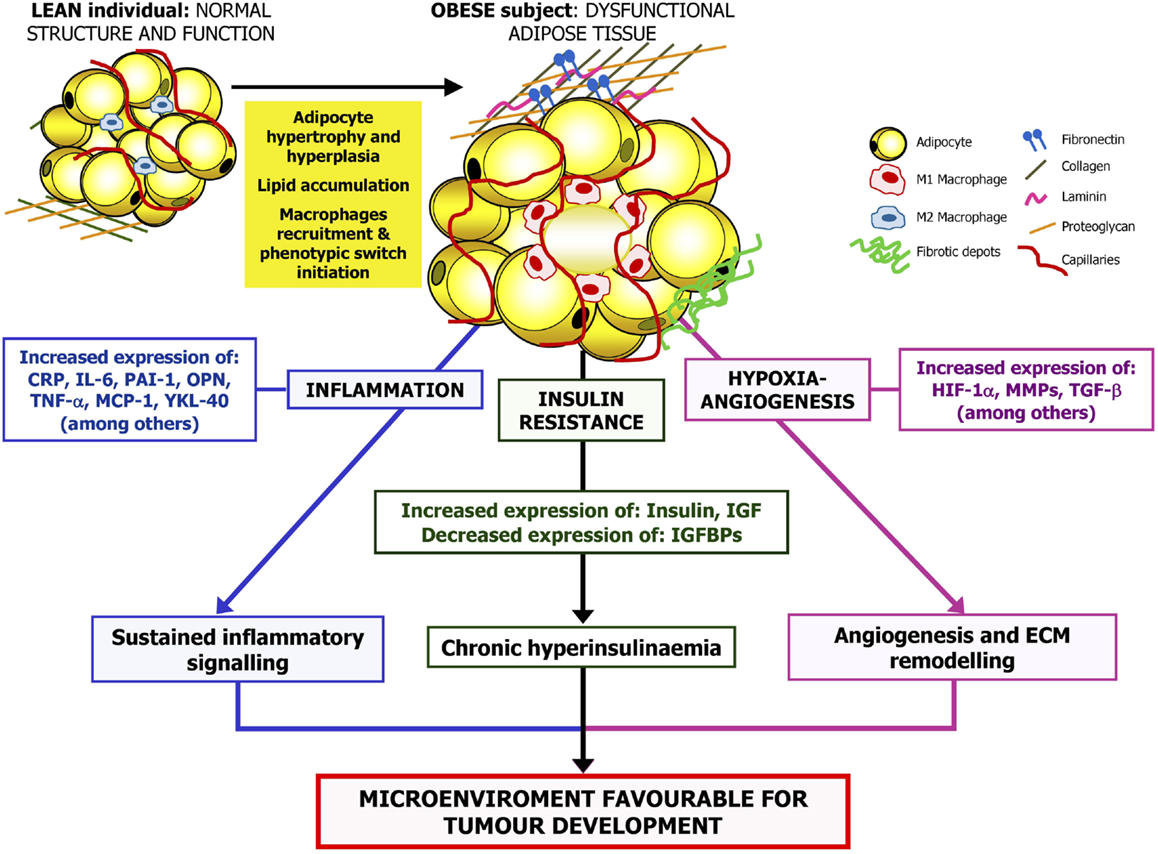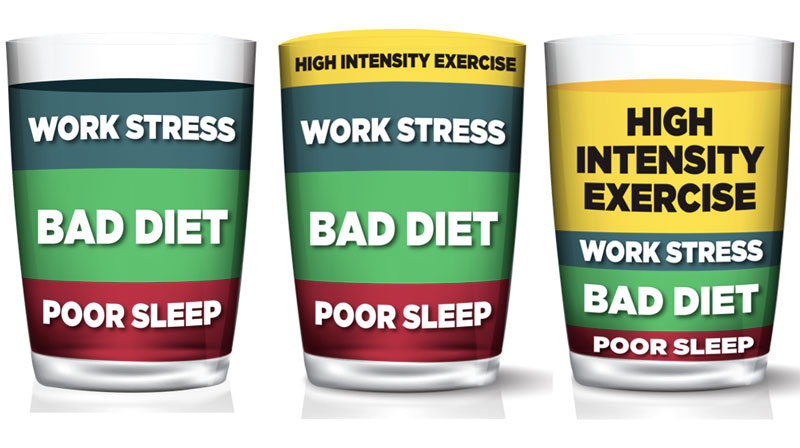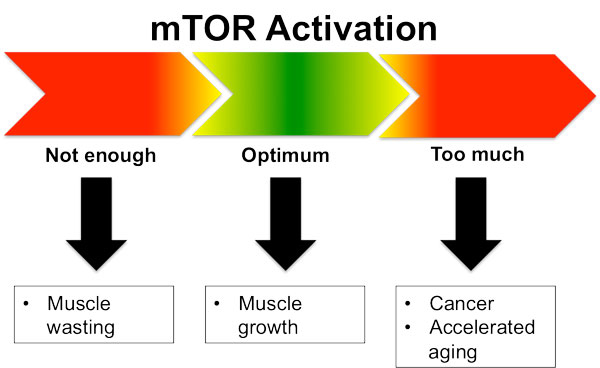- My Forums
- Tiger Rant
- LSU Recruiting
- SEC Rant
- Saints Talk
- Pelicans Talk
- More Sports Board
- Fantasy Sports
- Golf Board
- Soccer Board
- O-T Lounge
- Tech Board
- Home/Garden Board
- Outdoor Board
- Health/Fitness Board
- Movie/TV Board
- Book Board
- Music Board
- Political Talk
- Money Talk
- Fark Board
- Gaming Board
- Travel Board
- Food/Drink Board
- Ticket Exchange
- TD Help Board
Customize My Forums- View All Forums
- Show Left Links
- Topic Sort Options
- Trending Topics
- Recent Topics
- Active Topics
Started By
Message
re: 40% of all US cancer diagnoses due to weight issues. Personal decision making, people!!
Posted on 10/3/17 at 7:50 pm to HailHailtoMichigan!
Posted on 10/3/17 at 7:50 pm to HailHailtoMichigan!
Yes. This is probably the biggest recognized threat to our country...
Posted this before Thread, but worth repeating
The proper way to view fat/adiposity is as a nefarious functioning endocrine organ
At its roots, the underlying problems are:
-inflammation
-hormonal disruption



NIH
Using polarity, skeletal muscle and bone density can/should be viewed as opposing forces that combat the issues above..
Goals:
maximize muscle mass, bone density through load bearing / resistance exercise (minimal effective dose principle)
more muscle = enhanced glucose partitioning = increased insulin sensitivity = decreased insulin resistance
I have commented ad nauseam here in the past about proper nutrition
When viewed through this lens (instead of a strictly thermodynamic math problem), much becomes clearer....
Dynamic inputs into a dynamic system
Posted this before Thread, but worth repeating
The proper way to view fat/adiposity is as a nefarious functioning endocrine organ
At its roots, the underlying problems are:
-inflammation
-hormonal disruption



NIH
quote:
How might obesity increase the risk of cancer?
Several possible mechanisms have been suggested to explain how obesity might increase the risks of some cancers.
Obese people often have chronic low-level inflammation, which can, over time, cause DNA damage that leads to cancer. Overweight and obese individuals are more likely than normal-weight individuals to have conditions or disorders that are linked to or that cause chronic local inflammation and that are risk factors for certain cancers (26). For example, chronic local inflammation induced by gastroesophageal reflux disease or Barrett esophagus is a likely cause of esophageal adenocarcinoma. Obesity is a risk factor for gallstones, a condition characterized by chronic gallbladder inflammation, and a history of gallstones is a strong risk factor for gallbladder cancer (27). Chronic ulcerative colitis (a chronic inflammatory condition) and hepatitis (a disease of the liver causing inflammation) are risk factors for different types of liver cancer (28).
Fat tissue (also called adipose tissue) produces excess amounts of estrogen, high levels of which have been associated with increased risks of breast, endometrial, ovarian, and some other cancers.
Obese people often have increased blood levels of insulin and insulin-like growth factor-1 (IGF-1). (This condition, known as hyperinsulinemia or insulin resistance, precedes the development of type 2 diabetes.) High levels of insulin and IGF-1 may promote the development of colon, kidney, prostate, and endometrial cancers (29).
Fat cells produce adipokines, hormones that may stimulate or inhibit cell growth. For example, the level of an adipokine called leptin, which seems to promote cell proliferation, in the blood increases with increasing body fat. And another adipokine, adiponectin—which is less abundant in obese people than in those of normal weight—may have antiproliferative effects.
Fat cells may also have direct and indirect effects on other cell growth regulators, including mammalian target of rapamycin (mTOR) and AMP-activated protein kinase.
Other possible mechanisms by which obesity could affect cancer risk include changes in the mechanical properties of the scaffolding that surrounds breast cells (30) and altered immune responses, effects on the nuclear factor kappa beta system, and oxidative stress
Using polarity, skeletal muscle and bone density can/should be viewed as opposing forces that combat the issues above..
Goals:
maximize muscle mass, bone density through load bearing / resistance exercise (minimal effective dose principle)
more muscle = enhanced glucose partitioning = increased insulin sensitivity = decreased insulin resistance
I have commented ad nauseam here in the past about proper nutrition
When viewed through this lens (instead of a strictly thermodynamic math problem), much becomes clearer....
Dynamic inputs into a dynamic system
This post was edited on 10/3/17 at 7:56 pm
Posted on 10/3/17 at 7:51 pm to ThinePreparedAni
From a prior thread...
Other inputs into the "dynamic system" that will not show up on a thermodynamic ledger, but again matter tremendously...

Diet
Activity
Stress Management
Sleep
LINK
What people do not understand (and arguing in this thread) is that these variables need to change depending on:
Your age
What you are optimizing for
You goals
Sleep and stress management are non negotiable and will torpedo anyone trying to optimize diet/activity. These must be held in check.
So that leads us diet/activity:
The name of the longevity and quality of life game is to:
-maximize / optimize glucose partitioning
-practice relative caloric restriction
-preserve healthy skeletal muscle mass (the metabolic site optimizing glucose partitioning) while not over-promoting mTOR/ IGF-1 pathway (tumorigenic)
-optimizing the gut microbiome

LINK
A diet high in fat with moderate protein and relative carbohydrate restriction accomplishes the goals above while maintaining a robust quality of life. Strong hormonal satiety is invoked by a diet high in fat/protein. This allows for interval episodes of fasting (intermittent fasting) and less meals per day (if you believe in the limiting exposures to food additives sort of logic). Most would argue that this is the way the human species evolved to eat and manage food scarcity. In modern times it promotes compliance with a dietary lifestyle change.
Metrics such as grip strength, waist to hip ratio <0.9, and wether you can get up from a chair or the ground without assistance become very simple / practical predictors of longevity. Muscle preservation /strength set the tone for this resilience.
If your diet is dialed in, you have many more options with manipulating training volume.
If you are a professional athelete or elite solidier paid to train, it may be easier for you to handle massive training volume (assuming you are resting / managing stress)
If you are a 40 y/o Dad with 3 kids and a regular job, increased training volume becomes a physical, mental, and social stress. Increasing training volume becomes problematic.
The one constant that optimizes both examples (and all folks for that matter) is optimization of the diet.
Other inputs into the "dynamic system" that will not show up on a thermodynamic ledger, but again matter tremendously...

Diet
Activity
Stress Management
Sleep
LINK
What people do not understand (and arguing in this thread) is that these variables need to change depending on:
Your age
What you are optimizing for
You goals
Sleep and stress management are non negotiable and will torpedo anyone trying to optimize diet/activity. These must be held in check.
So that leads us diet/activity:
The name of the longevity and quality of life game is to:
-maximize / optimize glucose partitioning
-practice relative caloric restriction
-preserve healthy skeletal muscle mass (the metabolic site optimizing glucose partitioning) while not over-promoting mTOR/ IGF-1 pathway (tumorigenic)
-optimizing the gut microbiome

LINK
A diet high in fat with moderate protein and relative carbohydrate restriction accomplishes the goals above while maintaining a robust quality of life. Strong hormonal satiety is invoked by a diet high in fat/protein. This allows for interval episodes of fasting (intermittent fasting) and less meals per day (if you believe in the limiting exposures to food additives sort of logic). Most would argue that this is the way the human species evolved to eat and manage food scarcity. In modern times it promotes compliance with a dietary lifestyle change.
Metrics such as grip strength, waist to hip ratio <0.9, and wether you can get up from a chair or the ground without assistance become very simple / practical predictors of longevity. Muscle preservation /strength set the tone for this resilience.
If your diet is dialed in, you have many more options with manipulating training volume.
If you are a professional athelete or elite solidier paid to train, it may be easier for you to handle massive training volume (assuming you are resting / managing stress)
If you are a 40 y/o Dad with 3 kids and a regular job, increased training volume becomes a physical, mental, and social stress. Increasing training volume becomes problematic.
The one constant that optimizes both examples (and all folks for that matter) is optimization of the diet.
Posted on 10/3/17 at 7:51 pm to ThinePreparedAni
Also from another thread:
The easiest way would be to consider intermittent fasting (there is a huge thread on this on the food and drink board). Fast for 16 hours (skip breakfast) and eat in a 8 hour window.
Earn your carbs (as some posters have already pointed out).
2nd heuristic is to eat items that are closer in the food chain to the sun. Example:
plants (fruits ,vegetable) are great
animals (meat/natural fats) and animal products (eggs) that eat grass (great)
highly refined foods in boxes / fast food that have been adulterated by human hands (not so good)
Below are the best recs that likely applies to your mindset (based on what u posted)
Charles Poliquin Recs
Do not listen to the Philistines who insist that it is only about calories in and calories out (akin to telling your friends that the reason Bill Gates is so rich is because he makes more money than he spends. Technically you would be correct, but the statement is not very helpful/informative/actionable). Much more complex than that. Think of food quality, training, stress, sleep as inputs (via hormones) into a dynamic system (hence the recs above)
The easiest way would be to consider intermittent fasting (there is a huge thread on this on the food and drink board). Fast for 16 hours (skip breakfast) and eat in a 8 hour window.
Earn your carbs (as some posters have already pointed out).
2nd heuristic is to eat items that are closer in the food chain to the sun. Example:
plants (fruits ,vegetable) are great
animals (meat/natural fats) and animal products (eggs) that eat grass (great)
highly refined foods in boxes / fast food that have been adulterated by human hands (not so good)
Below are the best recs that likely applies to your mindset (based on what u posted)
Charles Poliquin Recs
quote:
#1: Eat High-Quality Protein For Breakfast
Eating high-quality protein for breakfast from eggs, fish, lean meat, or dairy is a big change most people need to make since high-carb breakfasts are so popular. Switching to protein-rich foods will improve energy levels throughout the day by raising the stimulating transmitter, dopamine. Protein also has the added benefit of reducing hunger and stabilizing blood sugar, setting you up to eat fewer calories naturally.
#2: Plan Meals Around Protein & Vegetables
Being nutrient-dense and lower in calories than similar sized high-carb or processed alternatives, veggies and protein should be your go-to foods for every meal. The protein will make you satisfied and the veggies are high in fiber and water for minimizing sensations of hunger. Add a healthy fat from nuts, seeds, or olive oil and you have a delicious, fat loss friendly meal.
#3: Weight Train Using Compound Lifts
Your first priority for exercise is to train with weights and do the compound, multi-joint exercises, such as squats, chest press, and pull-ups or rows. Such exercises will train the most muscle at a time and they allow you to lift more weight (remember to train with weights that have you reach failure by the 6 to 10th rep).
#4: Do Short Interval Sessions Instead of Long Cardio
Sprint interval training is a powerful tool for reducing body fat because it burns a lot of calories during and in the post-workout recovery period. It also builds muscle and improves levels of enzymes involved in fat burning and metabolic rate. Depending on your training level and situation, you can try intervals ranging from short all-out 30-second sprints to longer, more moderate intensity intervals lasting up to 2 minutes.
#5: Manage Stress With Relaxation Techniques
Besides being unpleasant, chronic stress is the enemy of fat loss because it raises the hormone cortisol. When cortisol is continuously elevated, it tells the body to sock away energy in the form of fat around your middle. High cortisol also stimulates appetite and cravings for high-carb, high-fat foods, which contributes to fat gain. The solution is a well-designed stress management plan that includes relaxation techniques such as deep breathing and mediation.
#6: Aim For A Restful 7 to 9 Hours of Sleep Every Night
Lack of sleep alters hormone balance and negatively affects metabolic rate. It also makes you hungry and reduces recovery from training. After all, during sleep is the time that your body returns to homeostasis and performs all the repair processes it wasn’t able to fit in during your busy day. Damaged tissue is repaired, your brain recovers, and growth hormone is released, having a powerful fat burning effect.
#7: Prioritize Recovery With Optimal Workout Nutrition
The right workout nutrition will allow you to optimize training performance and ensure you recover ASAP. Have a high-protein, healthy fat meal pre-workout instead of refined or simple carbs. Supplement with electrolytes and water during training, and get high-quality whey protein in the post-workout period. Additional training/recovery aids such as caffeine, creatine, beta alanine, BCAAs, citrulline, and glutamine may give you an extra edge.
#8: Control Inflammation
Acute (short-term) inflammation is a natural part of the recovery process, but it can easily get out of control with bad habits (lack of sleep, a poor diet, excessive stress) and make fat loss harder by affecting metabolism. Certain foods (turmeric, berries, nuts, chocolate, coffee) contain powerful compounds that protect you from the build-up of inflammation. Including these foods in your diet is the first step, but many people benefit from supplementing with anti-inflammatories such as curcumin, which is derived from the spice turmeric.
#9: Favor Short Workouts Over Excessively Long Ones
Many people think long workouts are the key to fat loss. They report the hours logged daily with pride and hope, but the reality is that once your training session passes 60 minutes, intensity drops and cortisol rises. Instead, use more frequent, short workouts to get the most out of your time and effort.
#10: Eat A Variety of Healthy Fats
Eating a low-fat diet is discouraged because it is associated with poorer health outcomes and deprives the body of fat-soluble nutrients (vitamins A, D, E, and K) and the compounds needed to make hormones. Plus, many fats contain nutrients that reduce inflammation and improve blood flow in the body. Enjoy a variety of fats from nuts, seeds, fish, meat, dairy, olive oil, and avocado for delicious diet and leaner body composition.
Do not listen to the Philistines who insist that it is only about calories in and calories out (akin to telling your friends that the reason Bill Gates is so rich is because he makes more money than he spends. Technically you would be correct, but the statement is not very helpful/informative/actionable). Much more complex than that. Think of food quality, training, stress, sleep as inputs (via hormones) into a dynamic system (hence the recs above)
Posted on 10/3/17 at 7:52 pm to DisplacedBuckeye
quote:
What's your standard for obesity?
Look down...don't see your pecker? You are obese.
Posted on 10/3/17 at 7:52 pm to HailHailtoMichigan!
The society needs to stop coddling and celebrating fatties. We need to get back to shaming.
Posted on 10/3/17 at 7:53 pm to ThinePreparedAni
quote:
can you post a link to help me with stress and anxiety reduction
Look into:
Reducing negativity bias (spend less time on Poli Board and reading/watching the mainstream news).
Reduce Facebook /social media (you can unfollow people on Facebook = one way communication where you can look them up if you want, but otherwise you will stop getting their feeds
Optimize sleep by avoid bright lights/blue lights/electronics prior to bed (strive to shut this off 1 hour prior to bed). For that hour you can consider:
-light reading with dim or red band light (blue light disrupts circadian rhythm and melatonin production):

F.lux is a blue light filter program for a laptop that dials the blue light down at sunset. Most newer phones have blue light filter settings
-prayer/mindfulness practice/ meditation. Good starting apps would be Headspace or Calm (guided meditation). Jacobsen progressive muscle relaxation is also helpful in bed. Google it for a more formal description (toe to head sequence of relaxing muscle groups, mental imagery, and breathing). More advanced apps would be Brain.fm (for focus, meditation and sleep). This practice seems "woo-woo", but can be very powerful with daytime carryover. People report being more of an "observer" of things that used to bother them instead of a "responder". I have had similar results. You could also do this first thing in the AM upon waking.
This post was edited on 10/3/17 at 7:59 pm
Posted on 10/3/17 at 7:54 pm to HailHailtoMichigan!
More important than just weight are factors such as diet, tobacco use, exposure to carcinogens, etc.
Morbidly obese people have many other worries than cancer, through the factors that led to the obesity very much increases cancer risk.
Morbidly obese people have many other worries than cancer, through the factors that led to the obesity very much increases cancer risk.
Posted on 10/3/17 at 7:55 pm to ThinePreparedAni
Other good resources:
Below is a good source for nutrition and wellness:
examine.com

Get outside, some sun when you can
Below is a good source for nutrition and wellness:
examine.com
quote:
The delightful and oh-so-Deutsche word for a circadian rhythm factor is zeitgeber. If you spend your workday indoors but watch TV and browse the web at night, work mostly alone during the day but socialize at night, and sit virtually motionless during the day but exercise at night, you’re effectively flipping three of the most important zeitgebers on their heads. So rather than investigating sleep supplements, let’s look into zeitgebers first.
The king of all zeitgebers is blue light. This light wavelength suppresses your body’s melatonin production. During the day, if you look up at the sky, you’ll see a free and powerful source of blue light: the sun. If you see the sun’s glorious light during the day, and shut off lights at night, hormones that vary throughout the day (such as cortisol and melatonin) are more likely to vary in the way you’d want them to.

Get outside, some sun when you can
Posted on 10/3/17 at 8:06 pm to arkiebrian
quote:
Look down...don't see your pecker? You are obese.

Posted on 10/3/17 at 8:55 pm to HailHailtoMichigan!
I have forever been a "personal choice" person. However, based on the most recent research, free will and choice or a human construct. You're "choices" are coded in your DNA and has little to do with your will.
Back to top


 1
1









